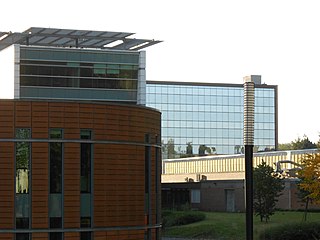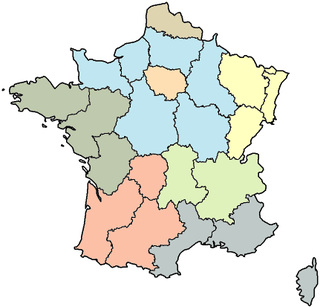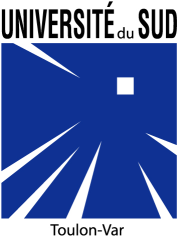
The Institut national de la recherche scientifique is the research-oriented branch of the Université du Québec that offers only graduate studies. INRS conducts research in four broad sectors: water, earth and the environment; energy, materials and telecommunications; human, animal and environmental health; and urbanization, culture and society.

El Bayadh is a municipality of Algeria. It is the capital of El Bayadh Province. This town was known as Géryville during the French colonization of Algeria.

The Lille 1 University of Science and Technology was a French university located on a dedicated main campus in Villeneuve d'Ascq, near Lille, with 20,000 full-time students plus 14,500 students in continuing education (2004). 1,310 permanent faculty members plus 1,200 staff and around 140 CNRS researchers work there in the different University Lille 1 institutes and 43 research labs. University Lille 1 was a member of the European Doctoral College Lille Nord de France, which produces 400 doctorate dissertations every year. The university is ranked in the world top 200 universities in mathematics by the Shanghai ranking.

In 1967 the Institut national de la statistique et des études économiques, together with the French Commissariat général and DATAR declared the nominal division of France into eight large regions. These were named Zones d'études et d'aménagement du territoire or ZEAT.

The Lille 2 University of Health and Law was a French university for health, sports, management and law. It was located in Lille and was part of the Community of Universities and Institutions (COMUE) Lille Nord de France.

The Ministry for the Ecological and Solidary Transition, was created as the Ministry of the Environment in 1971. Formerly named Ministry for the Environment, Energy and the Sea, formerly named Ministry of Ecology, Sustainable Development and Energy, formerly named Ministry of Ecology, Sustainable Development, Transport and Housing, it is an agency of the Government of France, centred on a cabinet member who is often referred to as the "Minister of Ecology" or "Minister of the Environment", and sometimes the "Energy Minister". Since October 2018, the position is occupied by François de Rugy. The ministry's administration is headquartered in La Grande Arche in La Défense and also, in Tour Sequoia, in Puteaux/ La Défense, near Paris, and in the Hotel de Roquelaure, boulevard Saint Germain, for the political cabinet of the Ministers.

Versailles Saint-Quentin-en-Yvelines University is a French public university created in 1991, located in the department of Yvelines and, since 2002, in Hauts-de-Seine. Consisting of eight separate campuses, it is mainly located in the cities of Versailles, Saint-Quentin-en-Yvelines, Mantes-en-Yvelines and Vélizy-Villacoublay / Rambouillet. It is one of the five universities of the Academy of Versailles.

The University of Technology of Troyes is a French university, in the Academy of Reims. The UTT is part of the network of the three universities of technology, found by the University of Technology of Compiègne. Inspired by the American University of Pennsylvania in Philadelphia, these three universities are a French mixture between the universities of this country and its schools of engineers .UTT is ranked in the top 10 engineering schools 2017 in France by Usine Nouvelle.

The University of Toulon is a French university located in Toulon, France and neighboring areas. It was founded in 1968 and is organized in 6 faculties, 2 autonomous institutes, an institute of business management and an engineering school.

Pierre Veltz is a French academic.

The Community of Universities and Institutions (COMUE) Lille Nord de France is a French Groups of Universities and Institutions (COMUE) spread over multiple campuses and centered in Lille. It includes a European Doctoral College and federates universities, engineering schools and research centers. With more than one hundred thousand students, it is one of the largest university federations in France. The University of Lille, with nearly 70,000 students, is the main component.
A Public Scientific and Technical Research Establishment is a category of public research institutes. In France, they were authorized by Law No. 82-610 of 15 July 1982. In Algeria, they were authorized by decree No. 99-256 of 16 November 1999.
The délégation interministérielle à l'aménagement du territoire et à l'attractivité régionale or DATAR was a French administration working for the Minister of Territorial Development. It applied decisions taken by the Interministerial Committee of Land Planning and Development (CIADT).
The French Institute of Science and Technology for Transport, Development and Networks is a public research institution created in 2011. It results from the merger of The French National Institute for Transport and Safety Research (INRETS) and the French Central Laboratory of Roads and Bridges (LCPC).
Danielle Bleitrach is a French sociologist and journalist. From the 1970s through the end of the century, she was CNRS researcher and lecturer at the Aix-Marseille University, focusing on the sociology of the working class and urbanization. From 1981 to 1996 she was a member of the Central Committee of the Communist Party of France, then the National Committee of the Party. She was also assistant editor-in-chief of the party weekly Révolution. She has contributed to La Pensée, Les Temps Modernes and Le Monde Diplomatique. In the 2000s and 2010s, after retiring from teaching, she co-authored texts on Cuba, Nazism and Ukraine.

Agrocampus Ouest is a French higher education institution of university-level, grande école-type. Its official name is Institut supérieur des sciences agronomiques, agroalimentaires, horticoles et du paysage. It operates under the supervision of the French Ministry of Agriculture.

Peter Jacobs is a Canadian landscape architect specializing in the conservation and development of rural and northern landscapes and in urban landscape design. He is Emeritus professor of the School of Planning and Landscape Architecture of the Universite de Montreal, Emeritus Chair of the Commission on Environmental Planning of the International Union for the conservation of nature (IUCN), Past President of the Canadian Society of Landscape Architects (CSLA), Chair of the Kativik Environmental Quality Commission and a Member of the Royal Canadian Academy of the Arts.
COUPERIN is an academic consortium in France. Formed in 1999, it includes more than 250 universities, research organizations, Grandes écoles (schools), COMUE, and others. The consortium negotiates with publishers the prices and conditions of access to scientific publications and other digital resources for the benefit of its members. It promotes open science, particularly with regard to scientific publications, both nationally and internationally. It is headquartered in Paris.












